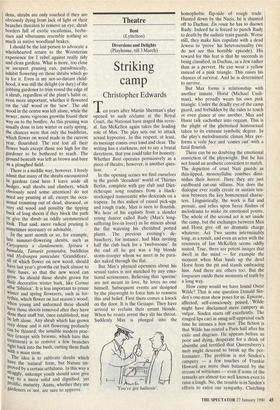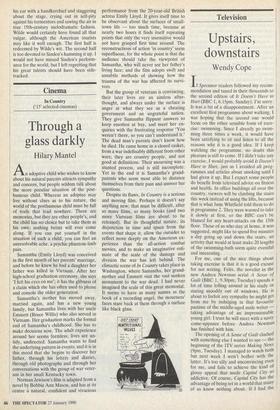Theatre
Bent (Lyttelton) Diversions and Delights (Playhouse, till 3 March)
Striking camp
Christopher Edwards
en years after Martin Sherman's play opened to such reclame at the Royal Court, the National have staged this reviv- al. Ian McKellen again takes the leading role of Max. The play sets out to attack sexual hypocrisy. In this respect, at least, its message comes over loud and clear. The writing has a starkness, not to say a brutal directness, that you could take for honesty. Whether Bent operates persuasively as a piece of theatre, however, is another ques- tion.
In the opening scenes we find ourselves in the garish 'decadent' world of Thirties Berlin, complete with gay club and Diet- richesque song routines from a black- stockinged transvestite who descends on a trapeze. In this milieu of casual pick-ups and rough trade, Max is seen to flourish. We. hear of his exploits from a slender young dancer called Rudy (Max's long- suffering live-in lover) as he minces about the flat watering his cherished potted plants. The previous evening's de- bauchery, for instance, had Max inviting half the club back for a `twelvesome'. In the end all he got was a big blonde storm-trooper whom we meet as he para- des naked through the flat.
But Max's physical openness about his sexual tastes is not matched by any emo- tional seriousness. Believing that 'queens' are not meant to love, he loves no one himself. Subsequent events are designed by the playwright to force him to reassess this arid belief. First there comes a knock on the door. It is the Gestapo. They have arrived to reclaim their errant blonde. When he resists arrest they slit his throat. Suddenly Max is plunged into the
T
`You've got halitosis'. homophobic flip-side of rough trade. Hunted down by the Nazis, he is shunted off to Dachau. En route he has to disown Rudy. Indeed he is forced to punch Rudy to death by the sadistic train guards. Worse still, they make him copulate with a dead Jewess to 'prove' his heterosexuality (we do not see this horrible episode). His reward for this feat is that he succeeds in being classified, in Dachau, as a Jew rather than as a pervert. He can wear a yellow instead of a pink triangle. This raises his chances of survival. And he is determined to survive.
But Max forms a relationship with another inmate, Horst (Michael Cush- man), who proudly wears his own pink triangle. Under the deadly eye of the camp guard, and forbidden by the rules to touch or even glance at one another, Max and Horst talk eachother into orgasm. This is the plight of the ghettoised homosexual taken to its extreme symbolic degree. In the play's melodramatic climax Max per- forms a volte face and 'comes out' with a fatal flourish.
There can be no doubting the emotional conviction of the playwright. But he has not found an aesthetic conviction to match. The depiction of cruel Nazi guards as thin-lipped, monosyllabic zombies dimi- nishes their horror. Here they are just cardboard cut-out villains. Nor does the dialogue ever really create or sustain ten- sion between the key homosexual charac- ters. Linguistically, the work is flat and prosaic, and relies upon fierce flashes of melodrama to make its emotional points. The whole of the second act is set inside the camp, but the exchanges between Max and Horst give off no dramatic charge whatever. Act Two seems interminably long, as a result, and even an actor with the resources of Ian McKellen seems oddly muted. True, there are potent images that dwell in the mind — for example the moment when Max hauls up the dead Horst from the pit and stands embracing him. And there are others too. But the longueurs outdo these moments of truth by a long way.
How camp would we have found Oscar Wilde? That is one question Donald Sin- den's one-man show poses for us. Epicene, affected, self-consciously poised, Wilde might have disclaimed mere campery as vulgar. Sinden starts off excellently. The rouged lips curl in smug self-appraisal each time he intones a hon mot. The fiction is that Wilde has rented a Paris hall after his exile and disgrace. He appears before us poor and dying, desperate for a drink of absinthe and terrified that Queensberry's mob might descend to break up the per- formance. The problem is not Sinden's campery — a few touches of Frankie Howard are more than balanced by the stream of witticisms — even if some of the remarks are almost too well known even to raise a laugh. No, the trouble is in Sinden's efforts to enlist our sympathy. Clutching
his ear with a handkerchief and staggering about the stage, crying out in self-pity against his tormentors and sawing the air in true 19th-century melodramatic fashion. Wilde would certainly have found all that vulgar, although the American tourists may like it well enough. The first half is redeemed by Wilde's wit. The second half is too devoted to Sinden's hamming it up. I would not have missed Sinden's perform- ance for the world, but I left regretting that his great talents should have been side- tracked.



























































 Previous page
Previous page